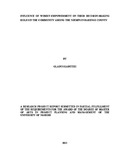| dc.description.abstract | Despite recent developments with respect to gender issues acknowledging that
empowerment of women will improve their status generally and enable them to actively
and effectively participate in key decision making processes at all levels of human
development, women are frequently neglected in economic, trade and development
policies and planning because of socio-historical patterns in regard to gender-based
inequalities and division of household roles. The purpose of this study was to establish the
influence of women’s empowerment on their decision making roles among the Njemps in
Baringo County – Kenya. The study was guided by three objectives: To determine the
influence women’s access to credit, to mobility in public space and educational attainment
on their decision-making roles in the community. The study adopted the descriptive survey
research design with both quantitative and qualitative approaches. The target population
for the study constituted all women from the 4,219 households in 6 administrative
Locations of Baringo District. The sample size for the study was 351 households at a
confidence level of 95% and margin of error 5.0%. Stratified sampling based on the
administrative Locations in the area of the study was used to obtain a representative sample
of the target population and ensure a balance of information gathered. Proportionate
allocation of the sample size based on the population of each Location was then done and
the households that participated in the study from each Location picked through simple
random sampling. The study utilized the questionnaire with both closed and open-ended
items and the key informant’s guide to collect primary data. The questionnaire was pilottested
on sample of 20 household female respondents drawn from 2 of the Locations. The
validity of the instruments was determined through expert judgment by the supervisor and
other research experts at the University of Nairobi. The reliability of the questionnaire
items stood at 0.82Cronbach alpha. The collected data was coded after validation and
editing, then entered into the computer. Data analysis was done with the aid of the
Statistical Package for Social Scientists (SPSS) Version 20. Data was analyzed using
descriptive statistics and the findings presented in frequency distributions and percentages
and Pearson’s Product Moment Correlation analysis done to determine the relationship
between women’s empowerment and their decision-making roles. Qualitative data
obtained from the open-ended questions in the key informant interviews was extracted,
common themes identified, organized and then discussed under the main objective areas of
the study. The study established that majority of the women (64%) had at least taken a loan
at some point. None of the respondents’ spouse made a unilateral decision on the amount
of loan to be taken. Significant positive relationships between women’s access to credit
and reproductive decision-making roles (r=0.13), cultural decision-making roles (r=0.36)
and socio-economic decision-making roles (r=0.14) at a 95% level of significance.
Significantly more than half of the respondents either never sought permission or at most
rarely sought permission to attend various functions or visit various places. There were
significant positive relationships between women’s mobility in public space and
reproductive decision-making (r=0.23), cultural decision-making (r=0.24) and socioeconomic
decision-making (r=0.11) and p<0.05. Higher levels of education were
associated with greater women participation in decision-making. The study recommended
the scaling up of efforts to empower women socio-economically so that women can have a
bigger voice in the society on issues that affect them and break the york of perpetual
subordinate role they have always played in the society. | en |

